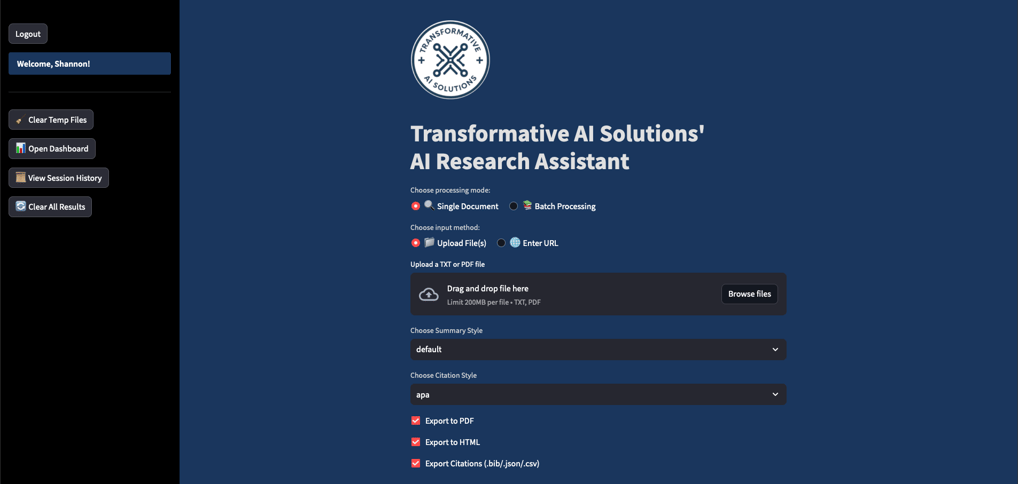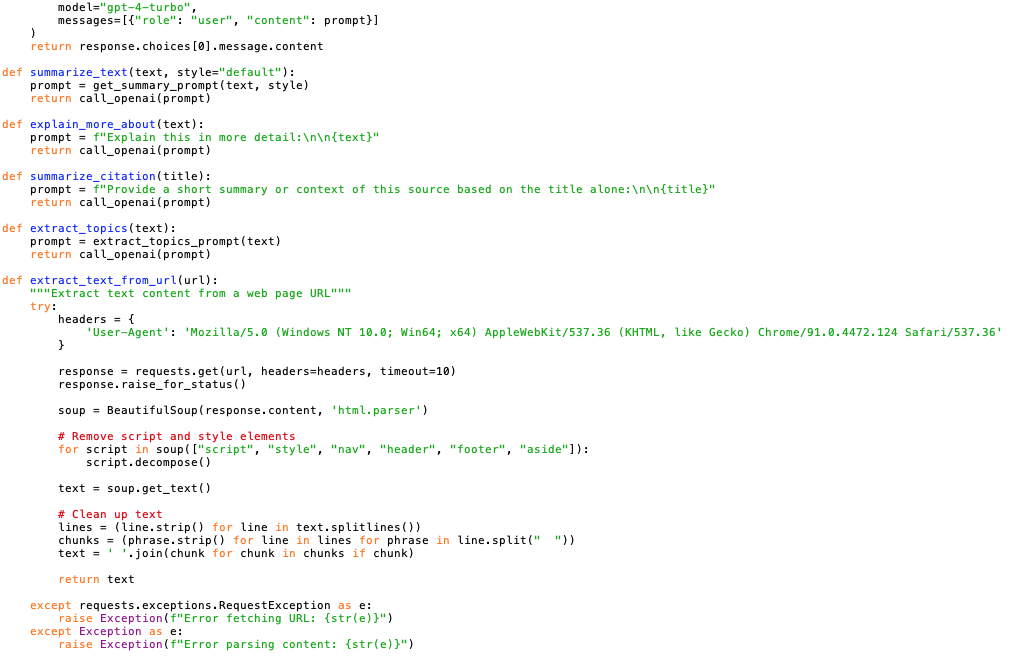🧠 Building a Research Assistant with AI: From Tool to Platform
🚩 The Challenge
I set out to solve a simple but common problem:
"How can I make research faster, smarter, and less painful when working with long academic or technical documents?"
The original idea was to build a lightweight tool for summarizing PDFs using GPT. But the project quickly evolved into something more—a modular, extensible AI-powered research assistant that supports multiple formats, automates citation handling, and exports professional summaries with just a few clicks.
🔧 The Solution
I built a full-featured AI-powered web app using Streamlit that integrates:
🧾 PDF and TXT file uploads
🌐 URL processing for online articles or PDFs
🤖 GPT-4 Turbo summarization (multiple styles)
📚 Citation detection and formatting (APA, MLA)
🧠 Topic detection
📤 Export to TXT, PDF, Markdown, HTML, BibTeX, CSV, and JSON
🔐 Local login system (with future encrypted database support)
🧪 Batch file processing
📁 Timestamped outputs and in-app previews


✨ Smart Summaries
Users can choose summary styles, reprocess specific sections, or ask the assistant to "Explain this further."
📑 Citation Wizard
The assistant detects in-text citations, fetches metadata via DOI/URL, and reformats them into APA or MLA automatically.
📂 Batch Processing
Upload multiple files at once (coming soon with progress bar support). Each document is summarized and cited separately.
📤 Flexible Exporting
Users can export results to multiple formats with a single click. File names are automatically timestamped for easy organization.
🔍 Feature Highlights
🧱 The Stack
Core Tools
Streamlit for the interface
OpenAI GPT-4 Turbo for summarization and explanations
pdfplumber, PyPDF2, and BeautifulSoup4 for parsing
fpdf for PDF export
YAML + streamlit-authenticator for login and user config (Temporary, Soon to be replaced with SQLite)
Custom Python utilities for citation parsing, formatting, and file management
💡 Technical Decisions That Paid Off
Modularity: I kept the codebase clean by separating citation logic, export utilities, and AI interaction modules.
Scalability-first: Even before SaaS considerations, I built with growth in mind—batch processing, export options, and file management all scale well.
User-first UX: I prioritized ease of use: checkbox controls, file previews, and download buttons make this accessible to non-technical users.
📈 Impact & Use Cases
While it started as a personal project, the app has real potential for:
Students writing annotated bibliographies
Researchers conducting literature reviews
Consultants extracting insights from dense technical or industry reports
Writers and journalists summarizing long-form research
“Finally, a research tool that doesn’t just summarize, but also tells me where the information came from.” — hypothetical future fan
🚀 What’s Next?
I'm preparing the app for a potential SaaS offering. Future additions include:
✅ Encrypted database for user sessions & projects
✅ Project save/load features
🌍 Multilingual summarization
📊 Visual dashboards and infographics
🧩 Prompt customization
📋 End-to-end research project workflow support
💼 Work With Me
This project is just one example of how AI tools—when applied thoughtfully—can solve real-world workflow problems.
If you're a:
Research-heavy organization
Educational platform
Knowledge-based consultant or analyst
Startup building custom AI workflows
Experienced Python Coder
👋 I'd love to work with you.
💬 Let’s Talk About AI Solutions
📁 Explore More Projects


Sample Python Code
Research Assistant User Interface
Insights
Explore AI consulting resources and product information.
Join the Newsletter
© 2025. Transformative AI Solutions. All rights reserved.
Contact: admin@transformativeaisolutions.com
